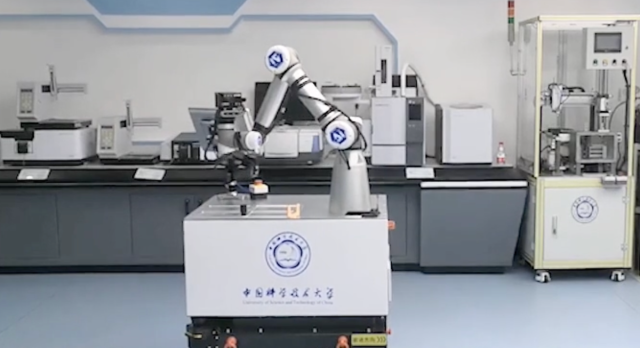Groundbreaking new robotic AI can produce oxygen on Mars – making it habitable
A robot created chemicals to make oxygen from Martian rocks. The same process would have taken a human 2,000 years, according to researchers

[Nov. 17, 2023: JD Shavit, The Brighter Side of News]
A robot created chemicals to make oxygen from Martian rocks. The same process would have taken a human 2,000 years, according to researchers. (CREDIT: Chinese Academy of Sciences (CAS))
In a significant leap towards the dream of colonizing Mars, Chinese scientists have unveiled a groundbreaking achievement—the creation of a robot chemist capable of producing oxygen from Martian rocks.
This remarkable achievement opens the door to the possibility of establishing sustainable colonies on the Red Planet by eliminating the need to transport vital supplies such as oxygen from Earth, a feat previously deemed exceedingly expensive and challenging. The robot's ability to autonomously analyze Martian minerals and perform experiments without human intervention marks a remarkable advancement in the field of extraterrestrial chemistry.
The Marvel of Martian Oxygen Production
The breakthrough discovery, was led by Jun Jiang at the University of Science and Technology of China in Hefei. Jun Jiang expressed the significance of their invention, stating, "We have developed a robotic AI system that has a chemistry brain." The primary goal of this robot chemist is to devise ingenious methods for synthesizing new compounds using available resources on Mars, taking humanity one step closer to self-sufficiency on the Red Planet.
Related Stories
One of the most daunting challenges facing the prospects of Mars colonization is the high cost and logistical complexity of sending essential supplies, such as oxygen, from Earth. The development of a robot chemist capable of producing oxygen on-site represents a potential game-changer in addressing this issue.
To test the capabilities of this innovative machine, it was assigned the task of generating oxygen from Martian soil, with strict instructions to rely solely on Martian resources. This ambitious mission called for the robot's artificial intelligence to analyze the composition of Martian meteorites using high-powered lasers and explore over 3.7 million chemical formulas to determine the ideal combination of elements that could serve as a catalyst for oxygen production.
Remarkably, the AI-driven robot chemist evaluated more than 200 potential catalysts, a task that would have taken a human researcher approximately 2,000 years to complete, according to a press release. Once the most suitable catalyst was identified, the AI proceeded to conduct laboratory experiments on Martian meteorite samples using a robotic arm. In a mere two months, it successfully developed a chemical catalyst that efficiently converted water into oxygen.
The focus is shifting towards utilizing local resources to meet the needs of future Martian colonies. (CREDIT: Creative Commons)
Jun Jiang, the lead researcher, envisions a future where humans can establish oxygen production facilities on Mars, all with the invaluable assistance of this AI-driven chemist. While there are alternative methods for generating oxygen on the Red Planet, such as NASA's Perseverance Rover's success in producing oxygen from Martian carbon dioxide, the focus is shifting towards utilizing local resources to meet the needs of future Martian colonies.
"Different chemicals can be made by this robot," Jiang noted, emphasizing the versatility of the technology. He further stated, "This breakthrough technology brings us one step closer to achieving our dream of living on Mars." Additionally, Jiang believes that the robot chemist could find applications for humanity's return to the Moon.
The MIT-led MOXIE project was able to produce oxygen on seven experimental runs on the Red Planet. (CREDIT: NASA/JPL-Caltech)
Looking Beyond Mars
The implications of this groundbreaking technology extend beyond Mars, as it has the potential to revolutionize the way humans explore and inhabit other celestial bodies. The robot chemist's capability to autonomously analyze and manipulate extraterrestrial resources offers a glimpse into the future of space exploration.
The creation of a robot chemist that can produce oxygen from Martian rocks represents a monumental achievement in the quest for Martian colonization. Chinese scientists have taken a significant step forward in making the Red Planet more habitable for future human settlers.
While other methods of oxygen production exist, the ability to harness the resources readily available on Mars brings us closer to achieving self-sufficiency in our quest to explore and potentially inhabit other worlds.
As we continue to push the boundaries of space exploration, innovations like this AI-driven robot chemist open up new possibilities for a future beyond Earth's confines.
For more science stories check out our New Innovations section at The Brighter Side of News.
Note: Materials provided above by the The Brighter Side of News. Content may be edited for style and length.
Like these kind of feel good stories? Get the Brighter Side of News' newsletter.
Joshua Shavit
Science & Technology Writer | AI and Robotics Reporter
Joshua Shavit is a Los Angeles-based science and technology writer with a passion for exploring the breakthroughs shaping the future. As a contributor to The Brighter Side of News, he focuses on positive and transformative advancements in AI, technology, physics, engineering, robotics and space science. Joshua is currently working towards a Bachelor of Science in Business Administration at the University of California, Berkeley. He combines his academic background with a talent for storytelling, making complex scientific discoveries engaging and accessible. His work highlights the innovators behind the ideas, bringing readers closer to the people driving progress.



